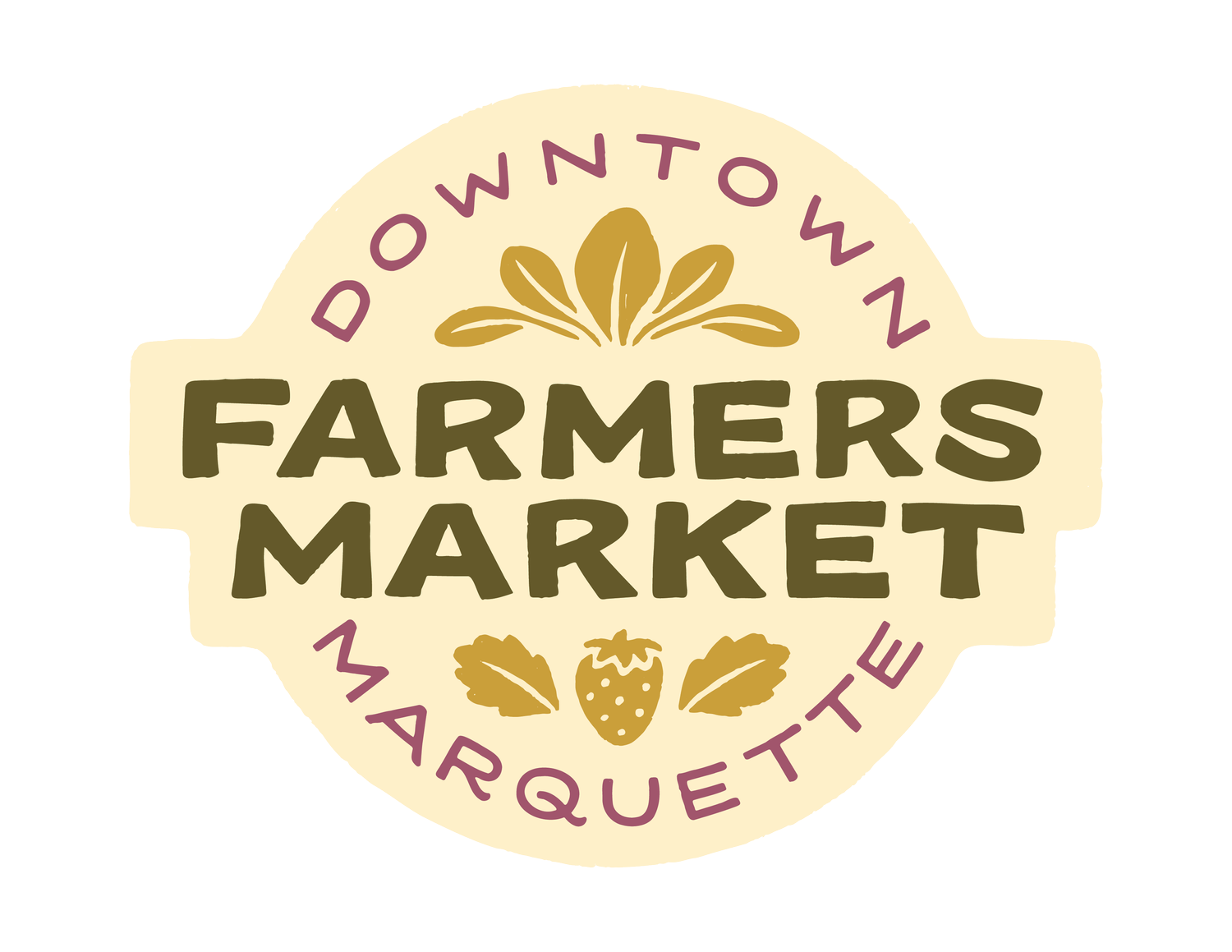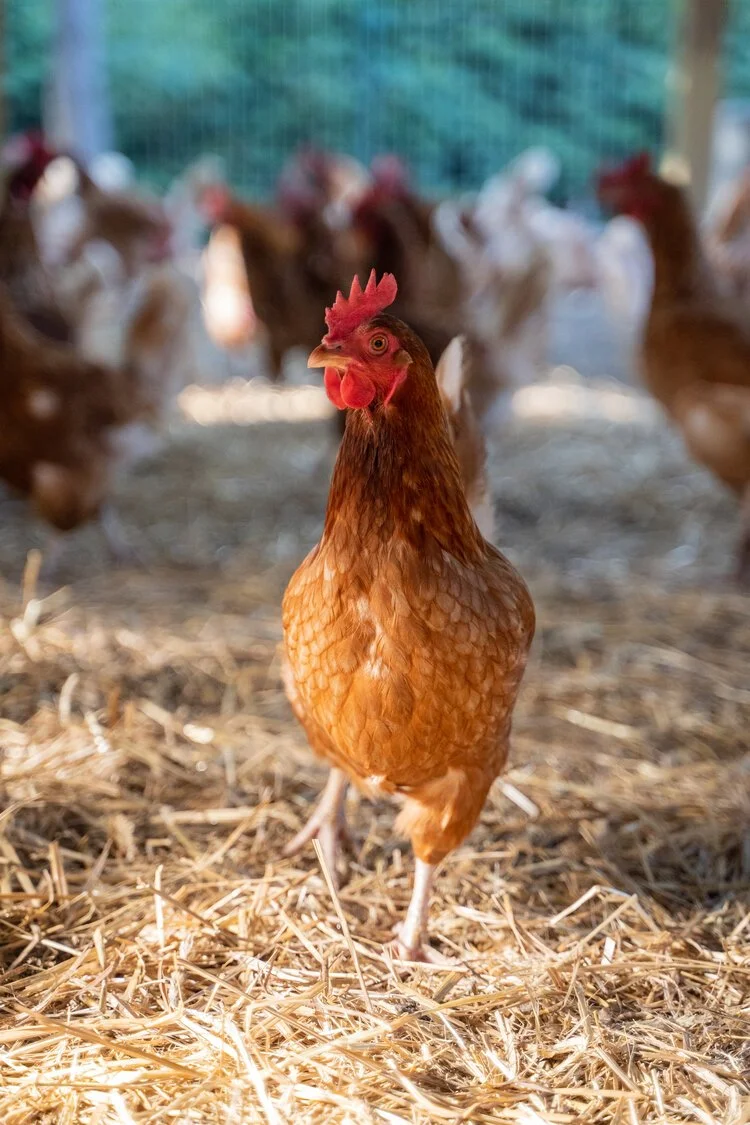$8 Market Eggs vs $3 Store Eggs
On a recent market survey, one of our shoppers asked, "Why would I buy $8 market eggs when I can buy $3 eggs from the store?"
That's a very fair question to ask! To help unpack the difference between market eggs and conventional store eggs, we spoke with Randy Buchler who owns and operates Shady Grove Farm in Gwinn, MI, along with his wife Libby. Randy is a long-time market vendor who exclusively sells eggs at our Saturday Morning Market. Randy is also a founding member and sits on the Board of Directors for the Michigan Small Farm Council. He prides himself in utilizing beyond organic practices, which provides the best life for his animals, plants, family, community, and planet.
Libby and Randy Buchler. Photo from https://gratefuleggs.org/
Purchasing eggs at the market supports local farms and keeps dollars in our local community
At the market, you have the opportunity to speak with the person who produces the eggs you are purchasing. This is a chance to know exactly where your eggs come from, what kind of environment the chickens who lay the eggs exist within, and most importantly, your purchase directly supports someone in our local community.
Market eggs come from small, local, unsubsidized farms that oftentimes have exemplary animal husbandry standards in place, compared to their conventional counterparts. Smaller farms are also more likely to implement regenerative farming practices that help to regenerate the land, soil, and farming ecosystems.
Market eggs come from chickens who are well cared for and in turn produce nutrient-dense eggs
Farmer Randy’s chickens live outside where they can roam in large fenced areas, forage and scratch in the dirt for worms, take dust baths, and do what chickens naturally do. They have more than adequate housing with plenty of room so that the chickens aren't crowded together. Randy’s operation is clean and well managed, which optimizes the health of the chickens, and the health of the land which in turn, helps to produce more nutrient-dense eggs than conventional eggs. According to Tracy Lockwood Beckerman, author of “The Better Period Food Solution,” when chickens have access to nutrients from grass, alfalfa, and clover, as well as access to the sun which boosts vitamin D levels, eggs have more nutrients like vitamins A, D, E, antioxidants, and omega-3 fatty acids.
Watch Randy give you a tour of Shady Grove Farm! Video from https://gratefuleggs.org/
On the other hand, conventional store eggs come from larger farming operations. According to the American Society for the Prevention of Cruelty to Animals, the roughly 330 million egg-laying hens in the U.S. are mostly raised in long, windowless sheds containing rows of stacked battery cages. Up to 10 hens are packed together in one wire cage roughly the size of a file drawer. The frustration of living in such unnatural conditions leads to abnormal pecking behavior and cannibalism. To fix this problem, the industry burns or cuts off a portion of hens’ sensitive beaks. With cages stacked and birds crowded together, workers may not be able to access or see all their birds, leaving sick or injured hens to suffer or die.
What chickens eat matters!
Feed is another vital aspect of the cost of eggs. Organic feed costs 3-4 times more than conventional feed. Most conventional store eggs come from chickens that are fed a conventional GMO grain feed, made up primarily of Round-Up Ready GMO soy and corn. These two grains are massively produced for animal feeds that are highly sprayed with synthetic pesticides, herbicides, and fertilizers. One of the most common chemicals used is Glyphosate, a known cancer-causing chemical.
Alternatively, Shady Grove Farm UP chickens are fed a certified organic, soy-free, corn-free diet. Farmer Randy works directly with his feed company to eliminate soy and corn from the feed which results in eggs that are higher in Omega 3’s and lower in Omega 6’s.
One of Randy’s “hippie chicks”. Photo from https://gratefuleggs.org/
According to Farmer Randy, “Raw soy contains enzyme inhibitors that impair the growth of chickens by causing nutritional deficiencies. Additionally, corn has very little nutritional value. It will provide a short boost of energy, but is basically empty carbs, which can lead to undernourished chickens. Corn also has anti-nutrients that can prevent the absorption of needed nutrients. This can in turn lead to poor health in the chickens. Also, there are many folks out there that have a corn sensitivity/allergy that want eggs that come from chickens that aren't fed corn, or soy.”
Fresh Shady Grove Farm eggs waiting to be placed in the carton for market! Photo from https://gratefuleggs.org/
Quick Recap
When it comes down to it, market eggs cost more than conventional eggs because they come from chickens who are well cared for. From their environment to their feed, market eggs are laid by chickens looked after by our local farmers. In turn, market eggs are nutrient-dense morsels of protein that offer better dietary enrichment compared to conventional store eggs. Best of all, market customers who have an EBT or P-EBT bridge card may use their benefits to purchase eggs from any of our vendors. Thanks for reading, and thank you for supporting our vendors and investing in our local community!
Randy offering Shady Grove Farm corn-free, soy-free eggs for sale at our Saturday Morning market. Photo by John Scheibe www.scheibejohn.com
“Did you know that the yolk color is only indicative of the hen’s diet and not the quality of the egg? The darker the yolk, the more likely the hen ate carotenoids - the natural orange pigments found in plants. That said, a chicken’s optimal diet is not vegetarian but omnivorous. Carotenoids alone determine the color of the yolk. Carotenoids are good, but you want the chicken to have eaten insects and animal proteins by foraging in their natural environment.”




